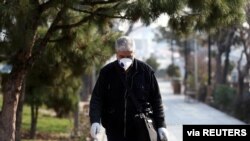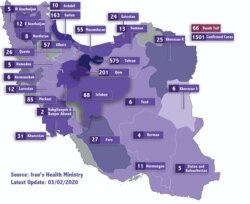Iran’s Islamist rulers faced a litany of complaints about their handling of the nation’s deadly coronavirus outbreak from disgruntled citizens who called in to a VOA Persian TV program.
In Monday’s edition of Straight Talk, Iranians who said they were calling from the capital Tehran and other parts of the country variously accused the government of being too slow to fight the virus, misleading the public about its spread, and using it to settle scores with perceived enemies. VOA could not independently verify the identity of the callers.
Iranian officials reported that the death toll from the virus that causes the disease COVID-19 rose to 66 from 54 on Sunday, while the number of cases jumped to 1,501 from 978. International health experts have said Iran’s relatively high ratio of deaths to cases versus other nations where the virus has spread indicates an underreporting of cases by Iranian authorities.
In a televised address Monday, Iranian Health Minister Saeed Namaki announced a mobilization of hundreds of thousands of personnel backed by Basiji militiamen to inspect homes across the country for signs of people infected by the virus. Basijis have a reputation for helping Iranian authorities to violently suppress anti-government protests in recent years.
“We will equip these 300,000 teams with diagnostic equipment,” Namaki said. “We will knock on everyone’s door, we will spot all the scattered (virus) cases in the country as soon as possible and refer them to medical centers.” He added that the home visits will begin this week.
Several callers to Straight Talk expressed confusion about what the inspections will involve. There was no word from the Iranian government.
“They want to take revenge on the Iranian people for all of the (recent) street demonstrations,” said a man who identified himself as Naser from Tehran. Iran has seen waves of nationwide anti-government protests in the past few years, including one in which authorities killed hundreds of people protesting increases in subsidized gasoline prices last November.
“Iranian authorities should have acted as soon as they found out about the coronavirus outbreak in China by controlling the comings and goings through Iran’s borders,” said a caller who gave his name as Abdulhamid in Tehran. “But they prefer us to die, so that they don’t have to worry about giving us subsidies,” he added.
The novel coronavirus that has spread to dozens of countries around the world first emerged in China in December.
Namaki, the Iranian health minister, had said the government approved his request to stop air travel to and from China in late January. But Iran’s Mahan Air has continued flying between Tehran and multiple Chinese cities since then.
Another caller faulted Iran’s government for rejecting offers of assistance in fighting the virus from the U.S., its longtime enemy.
“America is ready to provide us with medicine and medical care that people need,” said the caller named Siamak. “So why are you rejecting that aid and playing with people's lives?” he asked.
Iranian foreign ministry spokesman Abbas Mousavi said Monday that Tehran is “suspicious” of U.S. intentions and does not count on receiving any U.S. aid.
The Trump administration has been tightening sanctions against Iran since 2018 as part of a U.S. campaign of “maximum pressure” on Tehran to end perceived malign behaviors. But U.S. officials said they have notified Iran through Swiss intermediaries that they are willing to help it respond to the virus as part of humanitarian exemptions to U.S. sanctions.
This article originated in VOA’s Persian Service.






